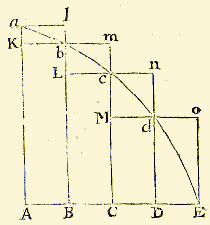MAT 131, Spring 2002
Course Description
Welcome to calculus!
 Calculus is
the mathematics of change and motion, of limits and areas. Although its beginnings
go back to Archimedes in ancient times (around 225 BC), it was not well-developed
until after the Renaissance, at the time of Newton and Leibnitz (late 1600's).
From the fact that the development took this long, one might surmise that
Calculus is a major intellectual advance. Indeed its mastery requires something
quite different from previous mathematics, the notions of limits or infinitesimals.
Because of this you should not be surprised to find that calculus is not easy.
(Read more about the
history of calculus ).
Calculus is
the mathematics of change and motion, of limits and areas. Although its beginnings
go back to Archimedes in ancient times (around 225 BC), it was not well-developed
until after the Renaissance, at the time of Newton and Leibnitz (late 1600's).
From the fact that the development took this long, one might surmise that
Calculus is a major intellectual advance. Indeed its mastery requires something
quite different from previous mathematics, the notions of limits or infinitesimals.
Because of this you should not be surprised to find that calculus is not easy.
(Read more about the
history of calculus ).
On the other hand today over 300 years after calculus was developed, we are in an age where some of its basic notions are ubiquitous. The applicability of calculus is so broad that fluency in it is essential for a successful career in science or engineering. The goal of MAT 131 is to develop your understanding of the concepts of calculus and to develop your ability to apply them to problems in mathematics, science, and engineering.
The basic objects of study in calculus (indeed, in much of mathematics) are functions. In this course, functions are presented and analyzed from several points of view: as symbolic formulae, as graphs, as numerical data, and as relationships between quantities arising in applications. Similarly, the three main concepts of calculus (limits, derivatives, and integrals) are studied from these vantage points. All of these approaches to understanding are essential.
Learning mathematics involves both achieving a deep understanding of concepts
and learning new skills. Your instructors can help you with both of
these, but ultimately your learning is your responsibility. A deep understanding
can be achieved by reading about, thinking about, and experimenting with the
ideas of calculus. Skills can only be developed through
practice .
Prerequisites: You must have completed either MAT 123 or MAT 130 or have received a score of 5 or better on the Mathematics Placement Examination (MPE) administered by the Department of Mathematics to all incoming freshmen. Other Mathematics and Calculus courses are more suitable if you received a lower (or higher) MPE score; see the document ``First Year Mathematics at Stony Brook'' .
 Text: The required textbook is Calculus: Concepts and Contexts,
Single Variable, Second Edition by James Stewart. You should read
the assigned sections before the lecture!
Reading the textbook will greatly increase your comprehension of the lectures
and enable you to ask useful questions in class. Furthermore, the lecturers
and recitation instructors will not always be able to cover all of the subject
material for which you will be responsible.
Text: The required textbook is Calculus: Concepts and Contexts,
Single Variable, Second Edition by James Stewart. You should read
the assigned sections before the lecture!
Reading the textbook will greatly increase your comprehension of the lectures
and enable you to ask useful questions in class. Furthermore, the lecturers
and recitation instructors will not always be able to cover all of the subject
material for which you will be responsible.
Homework: You cannot learn calculus without working problems. Homework problems will be assigned each week. Do all of the assigned problems. Solutions should be written neatly and clearly. Problems that ask you to ``explain'' or ``describe'' should be answered with complete English sentences. Solutions are due in recitation on the dates indicated; selected ones will be graded . It is also recommended that you work additional problems to increase your understanding. The problems on exams will be very similar to the problems assigned for homework! When your graded homework assignment is returned, take a moment to look over any problems that you got wrong. This will help you to correct and improve your understanding of the ideas and methods.
It is a good idea to form a regular study group of 3-4 people with whom you work on homework problems. When you are stuck on a problem, you have someone to ask immediately for help, and explaining ideas to others in your group helps you to clarify them yourself. If your whole group has trouble on a certain problem, get help from your recitation instructor, your lecturer, your classmates, or from tutors in the Math Learning Center . However, you must write up the solutions to homework problems yourself. Simply copying someone else's solution and putting your name on it is representing the work as your own. This is considered plagiarism and is a violation of the university's code of academic conduct.
Examinations: The examinations are common to all sections of MAT 131. There will be an early midterm exam, two evening examinations, and a final examination, scheduled as follows.